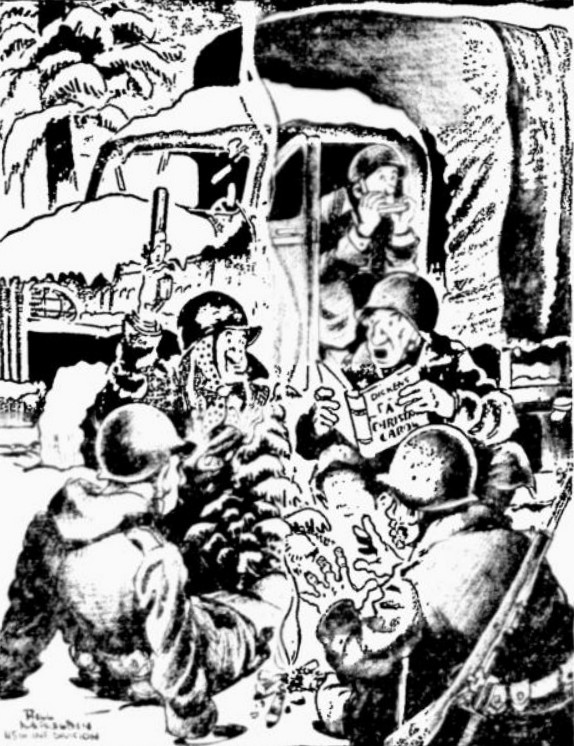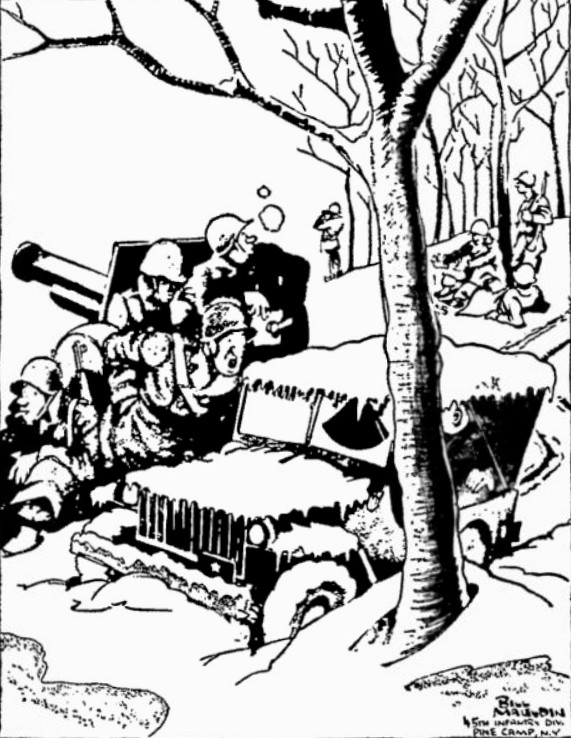The Pittsburgh Press (December 27, 1943)

Roving Reporter
By Ernie Pyle
At the frontlines in Italy – (by wireless)
Shells and big guns cost money, but it’s better to spend money than lives.
Along that line, a bunch of us were sitting around conjecturing, the other day, on how much it costs to kill one German with our artillery.
When you count the great cost of the big modern guns, training the men, all the shipping to get everything over here, and the shells at $50 each, it surely would cost $25,000 for every German we kill with our shelling.
One fellow said:
Why wouldn’t it be better just to offer the Germans $25,000 apiece to surrender, and save all the in-between process and the killing? I bet they’d accept it too.
It’s a novel theory, but personally I bet they wouldn’t.
One forenoon a nice-looking soldier walked up and sat down on the earthen bench behind our gun pit. He was Cpl. Bubble Perritt of Peedee, South Carolina, and his jib is stringing telephone wires.
He ‘ain’t fard a gun’
The other boys were kidding him about having a soft job and he was saying he walked more in one day then they did in a month. Finally, he said in a soft Southern accent.
Say, I’ve been in the Army three years and ain’t fard a gun yet.
Sgt. Jack McCray said:
All right, come on. You can shoot the next one.
So, Bubble came over, pulled the lanyard, and sent the big shell on its way. He dusted off his hands and said, surprised-like:
Ho, I always thought you boys had something to do.
They chased him out of the gun pit.
When the battery moves, each gun is pulled by a huge Diamond-T truck. It’s no picnic moving these guns over the mountains and through deep mud. On a recent move, our gun turned over twice in one night when it skidded off the road.
When they arrive at a new position, the whole crew turn to with shovels and dig a pit for the gun and bring up logs to keep the gun from kicking itself out of position. I imagined it would take hours to lay in the gun mathematically, get it all braced and everything, but the boys say that on extreme occasions they can fire in eight minutes after reaching a new position.
Among those present
There are several of my gun crew whose names I haven’t had a chancer to mention, so I’ll put them down in order that their folks may know how they are living and that they are all right. The remainder of the crew are Cpl. James Smith of Dogwood, Tennessee; Pvt. Roy Christmas and Pvt. Oscar Smith of Marion, South Carolina; Pvt. Wayne Hedden of Hawarden, Iowa; Pvt. John Borrego and Pvt. Charles Hook of St. Joseph, Missouri.
Ordinarily powdered eggs are fairly hard to get. I think the worst I ever ate were those in England, and the best were the work of Mess Sgt. Clifton Rogers of Mullins, South Carolina, who cooks for our artillery battery. Sgt. Rogers cooks with imagination. Here’s his recipe for powdered eggs for approximately 100 men:
He takes two one-gallon cans of egg powder, pours in 16 cans of condensed milk and four quarts of water, mixes it up into a batter, then dips it out with a ladle and fries it in bacon grease.
The result looks like a small yellow pancake. It’s frizzled and done around the edges like a well-fried egg, and although it tastes only vaguely like an egg it still tastes good. And that’s all that counts.
Speaking of powdered eggs and all the other forms of dehydrated stuff we get, one of the soldiers said the other day we were now sending over dehydrated water from America.


